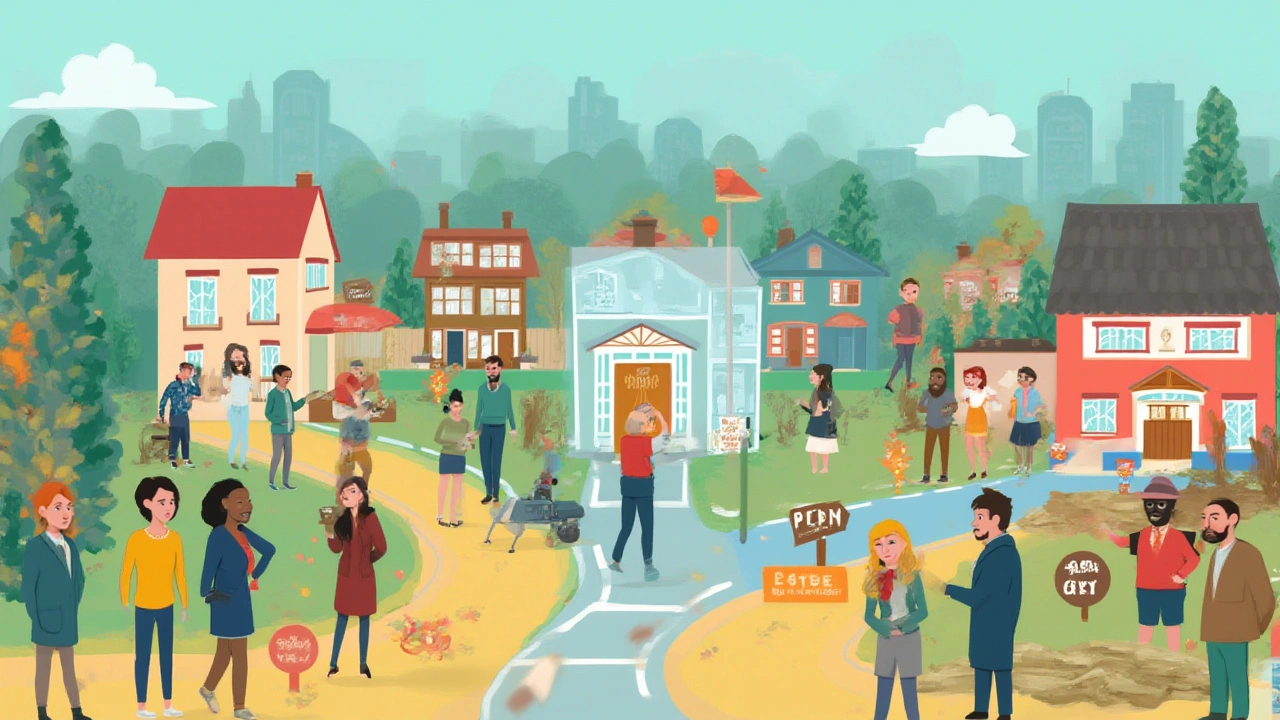Every week, someone tells me a wild story about selling their home. One friend swears by that no-frills, DIY approach—painting walls themselves, taking awkward phone calls at dinner, even hosting viewings while their golden retriever barked up a storm. Another paid a hefty fee for an estate agent and fell into arguments about valuations and commission. And then there’s the modern crowd—uploading photos to slick online platforms, hoping for a speedy sale, only to deal with tricky buyers from afar. If you’re about to sell your house, you’re probably wondering: Who is actually best to sell your biggest asset with? It's not just about the price, but about trust, speed, control, stress, and the real-life stories behind the statistics.
The Traditional Route: Estate Agents Under the Microscope
Most people in the UK, about 85% according to a 2024 survey by Property Academy, still go with an estate agent to sell. That’s a huge vote of confidence—but why is this path so popular in our ultra-digital world? For one, estate agents claim they know the local market inside out. They’ve got access to data you’ll never see on Rightmove, and they usually have an all-important mailing list of eager buyers, the kind who sign up before a house even hits the web. Agents typically handle everything: valuing your home, professional photographs, writing a punchy listing, marketing, hosting viewings, chasing offers, and even negotiating when buyers try to chip you down.
But it comes at a price. In 2025, estate agents in the UK charge, on average, 1.42% (plus VAT) of the final sale price, usually paid only after completion. That’s about £5,320 on a £375,000 home. Still, good agents often negotiate the price up by more than their fee—a 2022 study found quality agents secured an average £12,000 higher selling price compared to DIY sellers. If you don’t have time, confidence, or nerves of steel, agents can be a lifeline when buyers start nitpicking after survey results or late-night emails ask for "just one more viewing."
Of course, not all agents are equal. Some rely on glossy photos, but fall short when it comes to answering buyers’ questions or chasing up paperwork. Picking the right agent needs homework. Don’t go for the one with the cheapest commission: talk to recent sellers in your area, check actual sales (not asking prices), ask who will handle your sale day-to-day, and probe for real-life examples of tough sales they’ve rescued. Beware of overvaluations—some agents inflate their figures just to win your business, only for price slashes a month later. And don’t be shy about discussing communications: do they use WhatsApp, callbacks, or will you be left lurking in email limbo?
Lots of agents now offer different payment models. While the standard is a no-sale, no-fee percentage, some try to tempt you with upfront fees or fixed prices. Be wary: if you’ve paid all or part of the fee before your house sells, their motivation could vanish. Always check the sole agency contract length too: standard is 8-12 weeks, but don’t tie yourself in for longer unless you absolutely trust them to deliver.
Going Digital: Are Online Platforms the New Normal?
Back in 2010, nobody imagined you could sell your house like you book a holiday, but in 2025, online-only platforms are a huge part of the property game. These websites—like Purplebricks, Yopa, and Strike—charge a flat fee (often between £999-£1,499), usually paid upfront. Some even offer a ‘pay later’ option, rolled into your completion costs. For a typical UK home, this can save you thousands—at least in headline fees. The main lure is cost-effective exposure: your property hits Rightmove, Zoopla, and sometimes, local platforms. And you get to control everything through a dashboard—book viewings, chat to buyers, view feedback instantly.
But the flat-fee model is a double-edged sword. If your home sits on the market, or you change your mind about selling, you’re out of pocket. Reviews are mixed: according to a 2023 Which? survey, 38% of sellers with online agents said they felt unsupported during the trickiest negotiations, compared to only 14% using traditional agents. Some online firms do offer ‘viewing packages’ or in-person valuation upgrades, often at extra cost. If you’re comfortable talking money and handling buyer questions, you might find the hands-on approach empowering. But a word of warning: you’ll have to filter out time-wasters yourself, and sometimes juggle viewings at awkward times. If you work full-time, it’s easy to underestimate how stressful that 3rd round of negotiations can get.
Photos, as ever, are make-or-break. Some sellers snap their own and end up on social media “house fail” lists—think washing lines full of laundry or cluttered bedrooms. Smart sellers invest in a pro photographer (around £150-£250) to make every room pop on screen. Click rates for professional images are up to 35% higher, so this small investment pays back fast. Also, check the small print: not all online agents get your home onto every top portal, and some charge for extras like virtual tours or premium listings. Demand clarity before you sign anything.
If you live in a high-demand area—think London boroughs, Manchester, Cambridge—online selling can be ultra-fast, as buyers fight for every listing. But in slower markets, or for homes with unique quirks (grade II listings, converted barns, flats with short leases), you’ll want extra help navigating offers, contracts, and legal wrangles. In tricky sales, traditional local agents might still edge it, simply because they know who’s most likely to close successfully.

The DIY Approach: Is Selling Without an Agent Worth It?
Brave souls sometimes decide to “just do it themselves.” (Who hasn’t seen that handwritten “FOR SALE” sign in someone’s front yard?) In 2025, it’s actually legal and pretty easy to sell privately, no agent or online platform required. This method works best when you already know your buyer: maybe a family friend, a neighbour, or someone in your community. If you’re happy to do everything from pricing to paperwork, you can save the entire agent commission—meaning more cash in your pocket.
But, there’s no escape from the heavy lifting. You’ll need to write the listing, take photos, arrange viewings, negotiate price, chase documents, and keep everyone calm as legal teams drag their feet. Don’t underestimate the paperwork: you’ll be on the hook for gathering energy performance certificates, fixtures lists, and legal warranties. It gets trickier if any snags crop up, like a buyer’s chain falling apart at the last minute or a nervous surveyor lowballing your house value. When things get messy, you’ll either need thick skin or a solicitor who’s willing to play referee—and they’ll charge by the hour.
Buyers might also expect a ‘private sale discount’—in the 5-10% range, according to HomeOwners Alliance figures. Even after waving goodbye to agent fees, you might not walk away richer. And for every success story, there are tales of listings that drag on for months, only to sell below market value after nerves or desperate buyers smell blood in the water. Still, for a confident, well-networked seller, private sales can work great—especially in hot markets or for rare, unusual homes where both sides want to avoid formalities.
Protect yourself by using a good solicitor and keeping a paper trail for every step of the deal. If anything feels off, don’t hesitate to pause or seek advice. Remember, you only get one shot at a first listing—resetting a stale house is much harder than landing it right the first time.
Side-by-Side: Comparing All Selling Methods
So, which path actually wins out—in cost, stress, time, and final sale price? Here’s how things stack up in raw numbers and real-life experience. The choice is rarely black and white, but patterns do emerge.
| Method | Average Fee (%) | Upfront Cost? | Typical Time to Sale | Support Level | Typical Final Price Achieved |
|---|---|---|---|---|---|
| High-Street Agent | 1.42% + VAT | No | 8-14 weeks | Full service | Highest (avg. £12,000 above DIY) |
| Online Agent | Flat fee (£999-£1,499) | Usually Yes | 6-20 weeks | Remote/mixed | Varies (often 2-5% lower than traditional agent) |
| DIY Sale | £0 (solicitor fees apply) | No | 12-30 weeks | None (seller only) | Lowest (discounts expected) |
It’s always worth talking to more than one estate agent—even if you’re 90% sure you’ll go online or DIY. Treat the valuation process as a mini interview: ask how they’d market your home, who’d handle inquiries, how quickly they’d expect to get an offer. Don’t fall for flattery or scare stories about the “current market”—the stats are never as simple as they make out. Open bidding, sealed bids, and chain-free buyers can shift the odds completely, so use this intel even if you end up going it alone.
One tip from experienced sellers: however you market, keep a diary of viewings, calls, and offers. When the process drags (which it usually does), you’ll keep your facts straight. Also, check that every portal you use updates your house listing promptly—delays can cost you eager buyers, especially in peak moving season.
If you feel brave and know your stuff, DIY can work, but if you want less headache and a potentially higher sale price, the traditional agent route still comes out on top for most regular homes. Online platforms bridge the gap, offering control for a bit less money—just don’t understimate the time and stress involved. And no matter how you do it: always vet your solicitors just as carefully as your agent or platform. Nothing unravels a sale faster than legal hiccups ignored until the last minute.
At the end of the day, selling your house is more about what fits your life, energy, and nerves than any "one size fits all" advice. Whether you crave the trusted hand of an agent, the thrill of taking control, or the dashboard-driven efficiency of an online platform, make sure you feel seen, supported, and never out of your depth. That—alongside a healthy price—makes all the difference.
